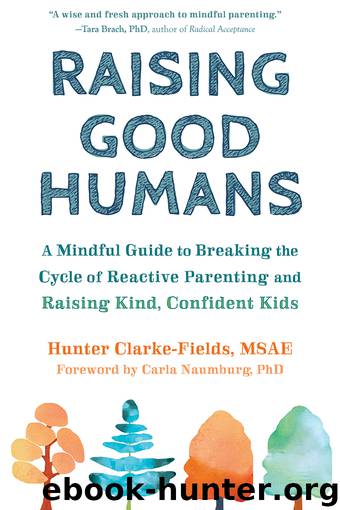Raising Good Humans by Hunter Clarke-Fields

Author:Hunter Clarke-Fields
Language: eng
Format: epub
Tags: parenting books;mindful parenting books;raising compassionate children;raising cooperative kids;respectful communication;positive parenting;raising mindful kids;parenting with love and logic;123magic;parenting books toddler;parenting books best sellers;how to talk so little kids will listen;whole brain child;mindful discipline;parenting books anger;parenting from the inside out;parenting paul david tripp;parenting a strong willed child
Publisher: New Harbinger Publications
Published: 2019-11-05T19:30:06+00:00
Helping Children Through Difficult Feelings
Scrolling through social media a while back, I saw a picture of a celebrity dad standing with other adults in a circle around his preschool-age daughter. She was on the floor, kicking wildly and clearly upset. He shared about how they were letting her have her tantrum and standing around her to keep her safe. Yes, she was on the dirty floor of a public place. Yes, strangers gawked and judged. But rather than give in to social pressure, he wisely gave his child space to release her emotions.
While I’ve long forgotten the name of the celebrity, I remember the sense of gratitude I felt at the powerful message he was sending: it’s okay for children to cry.
Expect and Accept Strong Emotions
Just like adults, children get flooded by strong emotions. In fact, because the prefrontal cortex doesn’t fully develop until children are in their early twenties, they are more prone to becoming flooded by strong emotions. This is an inevitable part of childhood, so as parents we need to expect and accept children’s difficult emotions. Just like adults, when kids block and repress emotions, those feelings pop out in potentially destructive ways, like exploding at a sibling. Let’s agree that we don’t want that. So just as we practice to accept our own emotions, we must seek to accept our children’s emotions and help them to accept their emotions as well.
Yes, well, we may agree that we don’t want to teach our children the repression that we learned, but do we really feel okay about our children feeling anger or sadness? Often we feel so uncomfortable with their strong emotions that our instinct is to “fix” it right away. We distract them with toys or screens. We tell them, “Don’t cry.” We say, “You’re okay.” When we practice accepting and allowing children to have difficult feelings, instead of fixing them, our modus operandi changes. Now our work becomes taking care of our own discomfort—because there’s nothing to change or fix for the child.
What does this mean? What does not fixing look like in action? It may look like the example of the celebrity letting his daughter tantrum (safely) in a public place. It may mean not shutting your child in his room when he’s having a cry. It means taking a break from grocery shopping and leading your child outside to cry out her disappointment at not getting sugar cereal. It means reminding your child, “It’s okay to have anger” and “It’s okay to feel sad.”
Does this sound like strange parenting advice? The truth is that emotional expression is healthy. Just like us, our children need to feel it to heal it. They may need to talk, yell, or cry. When we come from a place of expecting these inevitable strong emotions, we don’t suffer the pain that comes from the knee-jerk reaction of denying this healthy expression. The thought, They shouldn’t feel like this is the second arrow that creates much of the suffering felt by us and our children.
Download
This site does not store any files on its server. We only index and link to content provided by other sites. Please contact the content providers to delete copyright contents if any and email us, we'll remove relevant links or contents immediately.
Should I Stay or Should I Go? by Ramani Durvasula(7661)
The Lost Art of Listening by Michael P. Nichols(7500)
The Rosie Project by Graeme Simsion(6387)
Beartown by Fredrik Backman(5742)
We Need to Talk by Celeste Headlee(5610)
Ego Is the Enemy by Ryan Holiday(5422)
Hunger by Roxane Gay(4923)
Suicide Notes by Michael Thomas Ford(4824)
I Love You But I Don't Trust You by Mira Kirshenbaum(3869)
Mummy Knew by Lisa James(3686)
Not a Diet Book by James Smith(3413)
Crazy Is My Superpower by A.J. Mendez Brooks(3398)
Toxic Parents by Susan Forward(3285)
Girl, Wash Your Face by Rachel Hollis(3282)
The Complete Idiot's Guide to Coping With Difficult People by Arlene Uhl(3145)
The Social Psychology of Inequality by Unknown(3024)
Name Book, The: Over 10,000 Names--Their Meanings, Origins, and Spiritual Significance by Astoria Dorothy(2986)
The Hard Questions by Susan Piver(2967)
The Gaslight Effect by Dr. Robin Stern(2791)
